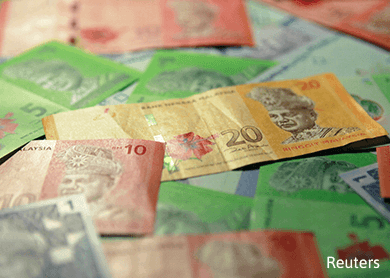
KUALA LUMPUR (Jan 9): Deutsche Bank predicts the ringgit will fall to the 2008 crisis level of 3.73 against the US dollar, as it believes that Malaysia's "worrying profile of indebtedness" will act as the currency's "Achilles heel" this year.
“Malaysia stands out as the weakest link in the region, boxed in on four metrics of indebtedness -- external debt metrics are worrying, the fiscal deficit is likely to overshoot, household debt is of concern, and the current account is at risk of dipping into deficit,” the bank said in a special report on Asia’s 2015 macro outlook today.
It noted that the weak basic balance position, rate hike expectations, lower oil prices and waning exports growth in recent months were the main factors that had driven down ringgit’s value in recent months.
It recommended a "sell" on the currency as it expected the ringgit to fall further this year, and gave Malaysia's macroeconomic outlook an “underweight” rating.
"In 2015, Malaysia’s worrying profile of indebtedness, on a wide range of metrics, will act as the currency’s Achilles heel,” Deutsche Bank warned, stressing that Malaysia's external debt was a source of "large currency risk" as the US dollar uptrend gathered steam.
"Malaysia’s reserves are only capable to cover the country's short-term (less than one year) external debt liabilities. This profile is one of the worst across emerging markets.
Not only is the reserves cover one of the lowest, the deterioration in the last five years has been amongst the worst,” it added.
It further opined that the central bank may provide level-based support for the currency, but will not oppose a sustained trend.
"BNM did in fact forcefully defend USD/MYR at 3.50 in December, drawing down close to $5bn of reserves in the first two weeks alone. Importantly though, BNM rarely holds the line for more than a few weeks at a time."
As for fuel subsidies savings from declining oil prices, Deutsche Bank did not think it would be sufficient to offset the decline in oil-related revenues for Malaysia as petroleum taxes and royalties account for about 20% of government revenue, which could now be cut by up to half.
The bank forecasts that the country's fiscal deficit could rise to 3.8%, even with expenditure cuts and revenues from the Goods and Services Tax (GST).
It also noted that household debt was worrying as it represented 87% of Gross Domestics Product (GDP) in 2013, the highest in the region.
It was concerned that difficulties such as the GST implementation and potential interest rate hikes that would be faced by households could post another threat to local economy.
“Given that private consumption has been the largest source of growth in Malaysia, accounting for three-quarters of GDP gains in the past five years, a slowdown in household spending could contribute significantly to growth deceleration,” the firm concluded.